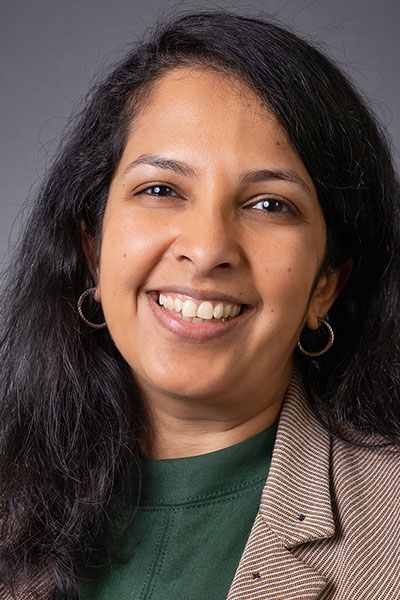Interstitial lung disease (ILD) encompasses a broad and variable group of diseases. They often have common symptoms and physical findings but can have different treatments and outcomes, making management challenging for both patients and clinicians.

The CHEST 2023 educational program features a comprehensive schedule of sessions covering timely topics in ILD and addressing key issues seen in clinical practice, including emerging diagnostic technologies, updates on both pharmacological and nonpharmacological treatment and management options, and management of ILD post-COVID, said CHEST 2023 Interstitial Lung Disease/Transplant Curriculum Group Chair, Debbie Levine, MD, MS, FCCP.
“There were a record number of outstanding expert ILD sessions submitted this year,” Dr. Levine said. “Each one of the sessions that is being presented was chosen to best update participants on the most current issues, including modalities for diagnostics and therapies, as well as a peek into future strategies on how we manage these patients.”
Post-COVID interstitial lung abnormalities
Among this year’s ILD sessions, Interstitial Lung Disease After Surviving COVID-19: An Update for 2023 will feature a panel of experts who will review different types of post-COVID interstitial lung abnormalities and what their clinical meaning may be prognostically, as well as provide an update on the latest in treatments and clinical trials for post-COVID ILD. The session will be held on Tuesday, October 10, from 8:30 am to 9:30 am HST, in Room 312 of the convention center.

This session is a follow-up to a standing room-only session held at last year’s meeting, when clinicians were seeing an alarming number of patients who survived COVID-19 but had persistent radiographic abnormalities after discharge, said Session Chair, Corey Kershaw, MD, FCCP, Professor of Pulmonary and Critical Care Medicine at the University of Texas Southwestern Medical Center.
“All of a sudden, we had this brand new group of patients who had a lung problem who did not have a lung problem before 2020. In my practice as an ILD pulmonologist, we were seeing a lot of patients referred to us who survived COVID and either still had abnormal radiology or had symptoms after they recovered,” Dr. Kershaw said. “Now, more than 3 years out from the start of the pandemic, we are beginning to see fewer of these patients, and we are beginning to see some data published clarifying the incidence.”
While there are currently no specific treatment recommendations for post-COVID ILD, he said, the good news is that most of these patients do not progress to severe disease and usually do not require treatment.
“We’re not quite to that point yet where we can tell everyone not to worry about it, but I’m optimistic that these patients are going to be okay,” Dr. Kershaw said.
Management of rural patients with ILD
The session Challenges and Innovations to Improving Care for Rural Patients With Interstitial Lung Disease will present a framework on the existing disparities and challenges in the management of patients with ILD residing in rural areas. It will be held on Wednesday, October 11, from 7:15 am to 8:15 am, in Room 311 of the convention center.

The care and management of any patient with ILD is challenging due to its heterogeneous etiology, but patients from rural communities encounter disparities that contribute to worse health outcomes, said Session Co-Chair, Tejaswini Kulkarni, MD, MBBS, FCCP, Assistant Professor and Director of the Interstitial Lung Disease Program at the University of Alabama at Birmingham.
“Pulmonary fibrosis is a progressive disease, and, while we are learning a lot more about it, there are still a lot of knowledge gaps and disparities that exist, especially when it comes to patients living in rural communities,” said Dr. Kulkarni, who is also on the steering committee for the Bridging Specialties™: Timely Diagnosis for ILD initiative from CHEST and Three Lakes Foundation.
The session will update attendees on the barriers to care for rural populations with ILD and potential strategies to improve access and delivery of subspecialty ILD care for rural patient populations.
“Our vision is to provide patients with pulmonary fibrosis who live in rural communities the ability to access comprehensive care, including not just pharmacological medications but pulmonary rehabilitation, management of their comorbidities, and access to lung transplant at the same level as our patients living in urban communities,” Dr. Kulkarni said. “The goal of this session is to highlight the disparities that exist for our rural ILD patients and discuss evidence-based measures that we can implement to bridge some of the knowledge gaps, reduce the disparities, and improve outcomes.”
For tools and insights that you can use in your daily practice to shorten the time to diagnosis for patients with ILD, access CHEST’s ILD Clinician Toolkit.
Other notable ILD sessions at CHEST 2023
Telomeres and Interstitial Lung Disease: What Do We Need to Know?
Sunday, October 8 | 7 am to 8 am HST | Room 313A
Innovative Imaging Techniques for Interstitial Lung Diseases
Monday, October 9 | 10:30 am to 11:30 am HST | Room 313C
Mock Multidisciplinary Discussion in Interstitial Lung Diseases: To Biopsy or Not
Monday, October 9 | 10:30 am to 11:30 am HST | Room 312
See a full list of sessions, sorted by type and topic, on the CHEST 2023 online schedule or in the CHEST Events app.
Join us at CHEST 2024
Connect in person with influential clinicians from around the world—and attend top-tier educational sessions focusing on the most relevant clinical topics. CHEST 2024 will have it all, including optional add-on sessions to customize your learning. Reserve your spot today, and save $100 when you register by September 22.





